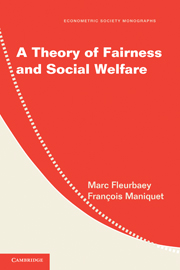6 - Specific Domains
Published online by Cambridge University Press: 05 January 2013
Summary
INTRODUCTION
The results of the previous chapter suggest that RΩlex and REW are salient social ordering functions for the problem of distribution of unproduced commodities. The characterization results have highlighted the ethical underpinnings of such criteria. The analysis of the previous chapter focused on the canonical framework and the basic concepts; we now turn to a series of extensions of the analysis to different frameworks or different concepts.
First, we focus on different domains of preference profiles. Section 6.2 is about a particular domain restriction, namely, that which occurs when preferences correspond to expected utility maximization and the various goods are contingent amounts of money in different states of nature. In Section 6.3 we examine what happens when the domain of profiles of individual preferences is enlarged to admit nonconvex preferences. This is more than a technical issue because nonconvexities in preferences are very likely to occur in many contexts. In this larger domain, the results single out RΩlex as the outstanding solution. Section 6.4 is devoted to the special case of homothetic preferences. In this smaller domain, the RΩNash SOF, introduced in Section 2.3 and based on the product of Ω-equivalent utilities, becomes interesting for the Walrasian perspective. Section 6.5 is devoted to the distribution of indivisible goods in the presence of an additional divisible good such as money. Indivisibilities affect the description of allocations, the domain of preferences, many of the axioms, and the definition of solutions.
- Type
- Chapter
- Information
- A Theory of Fairness and Social Welfare , pp. 98 - 114Publisher: Cambridge University PressPrint publication year: 2011



